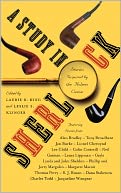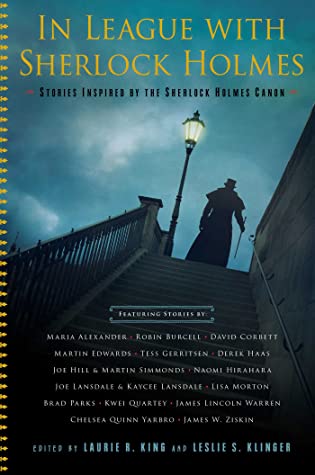 In League with Sherlock Holmes: Stories Inspired by the Sherlock Holmes Canon by Laurie R. King, Leslie S. Klinger
In League with Sherlock Holmes: Stories Inspired by the Sherlock Holmes Canon by Laurie R. King, Leslie S. Klinger Format: eARC
Source: supplied by publisher via Edelweiss
Formats available: hardcover, ebook, audiobook
Genres: historical mystery, mystery
Series: Stories Inspired by the Holmes Canon #5
Pages: 368
Published by Pegasus Crime on December 1, 2020
Purchasing Info: Author's Website, Publisher's Website, Amazon, Barnes & Noble, Kobo, Bookshop.org
Goodreads
The latest entry in Laurie R. King and Leslie S. Klinger’s popular Sherlock Holmes-inspired mystery series, featuring fifteen talented authors and a multitude of new cases for Arthur Conan Doyle’s most acclaimed detective.
Sherlock Holmes has not only captivated readers for more than a century and a quarter, he has fascinated writers as well. Almost immediately, the detective’s genius, mastery, and heroism became the standard by which other creators measured their creations, and the friendship between Holmes and Dr. Watson served as a brilliant model for those who followed Doyle. Not only did the Holmes tales influence the mystery genre but also tales of science-fiction, adventure, and the supernatural. It is little wonder, then, that when the renowned Sherlockians Laurie R. King and Leslie S. Klinger invited their writer-friends and colleagues to be inspired by the Holmes canon, a cornucopia of stories sprang forth, with more than sixty of the greatest modern writers participating in four acclaimed anthologies.
Now, King and Klinger have invited another fifteen masters to become In League with Sherlock Holmes. The contributors to the pair’s next volume, due out in December 2020, include award-winning authors of horror, thrillers, mysteries, westerns, and science-fiction, all bound together in admiration and affection for the original stories. Past tales have spanned the Victorian era, World War I, World War II, the post-war era, and contemporary America and England. They have featured familiar figures from literature and history, children, master sleuths, official police, unassuming amateurs, unlikely protagonists, even ghosts and robots. Some were new tales about Holmes and Watson; others were about people from Holmes’s world or admirers of Holmes and his methods. The resulting stories are funny, haunting, thrilling, and surprising. All are unforgettable. The new collection promises more of the same!
My Review:
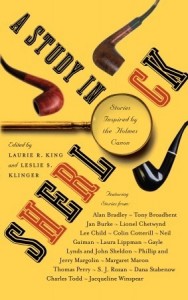 Because I’m a sucker for a good Sherlock Holmes pastiche, and in the right mood even for a bad one, I’ve eagerly anticipated each of these collections as they’ve appeared and I’ve read every single one of them, beginning with the very first, A Study in Sherlock back in 2011. This first entry in the series includes what is still my favorite story across the entire five volumes, The Case of Death and Honey by Neil Gaiman
Because I’m a sucker for a good Sherlock Holmes pastiche, and in the right mood even for a bad one, I’ve eagerly anticipated each of these collections as they’ve appeared and I’ve read every single one of them, beginning with the very first, A Study in Sherlock back in 2011. This first entry in the series includes what is still my favorite story across the entire five volumes, The Case of Death and Honey by Neil Gaiman
It’s hard to believe that this current volume is the fifth in the series, after A Study in Sherlock, In the Company of Sherlock Holmes, Echoes of Sherlock Holmes and For the Sake of the Game.
Like most such collections, this one is just a bit uneven. The stories that work, really, really work. The ones that don’t fall flatter than the proverbial pancake.
I think I’ve read every single one of these collections as they have come out, and my favorite is still the very first one, A Study in Sherlock, although I have certainly discovered favorite stories in many of the later volumes.
I have to say that this entry in the series did not live up to its predecessors. As the series has gone on, the stories have ranged further and further from their original inspiration, in ways that, at least in this particular volume, feel like they owe more to cleverness than detection.
To put it another way, I like my Sherlock to more or less be a kind of Sherlock. It’s not necessary that the stories feel like the original canon – unless that’s done well it can be terribly off-putting. But when I hear the name Sherlock Holmes I expect a detective story of some kind, and too many of the stories in this entry in the series seemed to be showing off how ‘twee’ they could be rather than how well they could solve a case.
But I still have two favorites even in this somewhat motley crew.
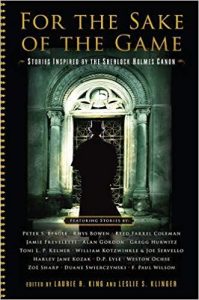 James W. Ziskin’s The Twenty-Five-Year Engagement is a classic pastiche, featuring the original Holmes and Watson solving a case that was so old and so cold no one even knew it was a case. It’s not the first time, that the unexpected return of a person long-though deceased has provided new clues to an old murder for the Great Detective, and this one shows the deft hand of both the investigator and the writer in constructing – and solving – such a conundrum.
James W. Ziskin’s The Twenty-Five-Year Engagement is a classic pastiche, featuring the original Holmes and Watson solving a case that was so old and so cold no one even knew it was a case. It’s not the first time, that the unexpected return of a person long-though deceased has provided new clues to an old murder for the Great Detective, and this one shows the deft hand of both the investigator and the writer in constructing – and solving – such a conundrum.
The Strange Juju Affair at the Gacy Mansion by Kwei Quartey was a classic of a completely different kind. It is the kind of Holmesian homage where, rather than Holmes himself serving as the detective, the investigator is someone who uses Holmes’ methods and applies them with Holmes’ genius at a time and place that Holmes never visited, in this particular case Kasoa, Ghana at an unspecified time period that feels like it is much later in the 20th century – if not the 21st – than Holmes would have lived to see. The detective is a retired police superintendent who never visits the crime scene, but with a few questions to his younger – and rather desperate – colleague still manages to solve a classic locked-room mystery.
Escape Rating B-: Too much of this entry in this long-running series went too far afield for this reader. But those two stories were right on the mark as lovely but totally different Holmes pastiches. Your reading mileage will, of course, vary. That is the point of these collections, that there is something for every reader looking for a taste, in this case a taste of Sherlock Holmes.

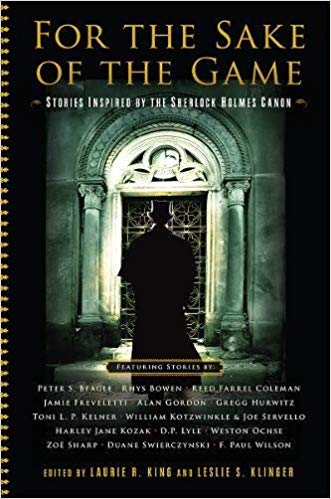 For the Sake of the Game: Stories Inspired by the Sherlock Holmes Canon by
For the Sake of the Game: Stories Inspired by the Sherlock Holmes Canon by 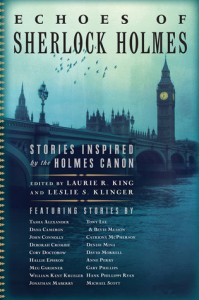 Welcome to my review of the biennual collection of Sherlock Holmes-inspired stories edited by Laurie R. King and Leslie S. Klinger. This is an every two years treat, as evidenced by my reviews of the previous collections in this quasi-series,
Welcome to my review of the biennual collection of Sherlock Holmes-inspired stories edited by Laurie R. King and Leslie S. Klinger. This is an every two years treat, as evidenced by my reviews of the previous collections in this quasi-series, 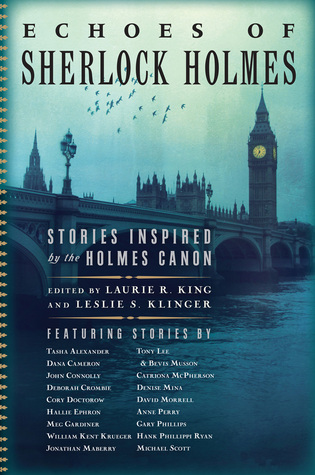 Echoes of Sherlock Holmes: Stories Inspired by the Holmes Canon by
Echoes of Sherlock Holmes: Stories Inspired by the Holmes Canon by 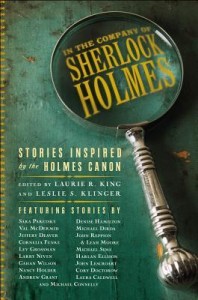 This collection is the third editorial collaboration of Laurie R. King and Leslie S. Klinger of newly commissioned tales that fall somewhere in the Sherlock Holmes tradition, if not the Holmes canon. Like the previous collections,
This collection is the third editorial collaboration of Laurie R. King and Leslie S. Klinger of newly commissioned tales that fall somewhere in the Sherlock Holmes tradition, if not the Holmes canon. Like the previous collections, 